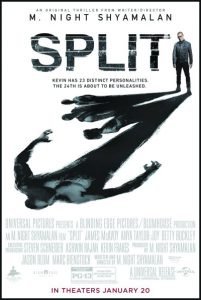
There are two perspectives to take to make “Split,” a thriller about a man stricken with multiple personalities, successful. The first is from the psychologist’s point of view. Through therapy sessions with Dr. Karen Fletcher (Betty Buckley), the multiple personality disorder bestowed upon Barry (James McAvoy) can be explored whilst remaining mysterious. Asides about his other personas and his uneasiness upon the questioning of his mental health clues the viewers in that something’s amiss. The tension slowly begins to mount as Barry becomes more unstable, hinting at ulterior motives ala a twenty-fourth personality that spells doom. Dr. Fletcher’s paranoia gets the better of her, prompting her to investigate further and uncover dark secrets.
The other perspective is from that of the abducted teenagers: Casey (Anya Taylor-Joy), Marcia (Jessica Sula), and Claire (Haley Lu Richardson). Thrust from the comfort of their suburban lives and locked in an undisclosed cellar, the tension mounts at a rapid pace as the three scramble to escape. When they see their captor arriving with a new swag, they begin to question his sanity. When he appears donning a skirt and impersonating a motherly figure, their confusion escalates. In turn, their bewilderment infects the audience, puzzled and frightened at the prospects. What threat does this man possess and what could he possibly mean when stating they have a greater purpose?

Night Shyamalan wants “Split” to be from both perspectives and that ultimately hinders the film. The two warring plots undermine one another as opposed to fortifying each’s strengths. The teenagers’ plight lacks an element of surprise as the twenty-three personalities are explored via expository therapy sessions. We know how dangerous the most prevalent personalities are, therefore sullying the mystery that plagues the characters. As for Dr. Fletcher, her investigation into her patient’s secret is without any suspense as the audience is two steps ahead of her. We know Barry abducted the three missing teenagers and are just waiting around for the psychologist to catch up.
Barry’s end goal and the identity of the twenty-fourth personality, only referred to as The Beast, remain a mystery in both plots. However, the juxtaposition between the two storylines is muddied, resulting in a lack of anticipation and sufficient intrigue. The film is never dull, mind you, moving at a brisk pace and failing to ever lose interest. There is intrigue, but not enough to supplant the drama. The movie becomes more of a curiosity than a fully captivating thriller.

Individually, the stories work. Betty Buckley brings a comforting warmth to Dr. Fletcher, presenting her as a caring therapist with Barry’s best interests at heart. Yes, she wants to use her research with him to further her agenda, but that ultimately aids him. By proving that those suffering from multiple personas can actually be playing host to different people, it allows them to be accepted into society as stronger minds that should be heralded, not feared. Barry’s ability to morph his body to his mind’s content is admittedly cheesy and is cranked up way too much in the finale, but the emotional motivation is vital in making both the drama and horror work.
As for the teenagers, their ordeal is downright chilling. Shyamalan injects familiar tropes into their proceedings, such as crawling through air ducts and narrowly escaping on multiple occasions. He orchestrates them to perfection, ratcheting up the claustrophobia and highlighting the desperation. Where it begins to fumble is in the heavy-handed tactics to promote the self-journey of one Casey Cooke. Through flashbacks, we’re let into her twisted tribulation with her Uncle John (Brad William Henke) which has stunted her emotionally (she’s the stereotypical outcast at the outset). She is able to overcome her demons as she fights back against Barry, using her intelligence and bravery to trick some of his lesser-minded personalities. The drama contained within the flashbacks is so forced that the self-actualization comes off as trite. The blunt symbolism about her being a lion doesn’t help matters.

There’s also an element of comedy that, on occasion, diminishes the tension as opposed to simply alleviating it. The comedy is welcome in the character of Hedwig, the precocious nine-year-old persona of Barry’s. It is befitting of that character to be simple minded, enough so that humor can be mined from it. One scenario has him being tricked into befriending Casey in order to access his room (in the hopes of escaping through a “window”); he dances around like a fool (i.e. me on the dance floor) and makes corny remarks about Kanye West. Another scenario has him kissing Casey and immediately informing her he thinks that made her pregnant. Sophomoric gags, but they complement the character and the situation he presents. Extracting humor from the OCD tendencies of Dennis and the bizarre interactions Dr. Fletcher has with her colleagues and family is problematic.
Kudos to James McAvoy for finely juggling the multiple personalities and avoiding the temptation of chewing the scenery too heavily. He gets his opportunity to do so in the form of Hedwig, but imbues a sense of innocence in the character that makes him endearing, not comedic. He may struggle when it comes to the twenty-fourth personality, but that’s a fault of the script, not his performance. He makes a great foil for Anya Taylor-Joy, who returns the favor with her confident performance.

And yet, I was never able to fully engage with “Split.” I enjoyed aspects of it and was enamored with the gimmick, but found the two conflicting plots to become too frustrating. They may collide in comfortable fashion, but they don’t co-exist in such. When one starts to pick up steam, the other comes along to slow them down. Their journeys undermine one another, ultimately dragging the production as a whole down. A small but robust twist at the end is tantalizing, but doesn’t make up for the pressing issues.
“Split” is a slickly-produced thriller with flourishes of tension, but ultimately comes up short despite its ambition. A stricter focus would’ve gone a long way in ironing out the issues.
Final Rating: C+
